K.E. Lanning's Blog, page 4
January 26, 2018
ASSEMBLY REQUIRED

I attended a writers’ conference the other day. As usual, it was filled with talks on marketing, publishing, and how-to improve your writing skills. And, as usual, it was during lunch that the most interesting conversations occurred. The small group I sat down to eat with was, as one writer characterized, “the onesies table.” She quickly explained that this table wound up being the table of authors who had come to the conference alone. Which isn’t surprising knowing that most writing is a solitary task. But is it?
The draft of a novel does tend to be a solitary act. But once that phase is completed, a team must built to bring the story to the publishing level. Traditional publishers have teams in situ to bring the steed into the grooming rack and curry away the mud and extraneous hair until a shining coat emerges. A slough of editors; developmental, copy-editors, and proofreaders, perfect the interior, while cover designers work their magic to create a cover to draw in the fickle reader. Then marketers, agents and publicists fluff up the author like a cardboard superstar on the internet. Photo shoots, public appearances, blogs, interviews, etc., etc., etc.

Courtesy of Hannsman Bookgroup
And the indie author must compete with all of that. Let me emphasize one word in the last sentence: MUST. If you, the next great author, want to be taken seriously, you must understand that writing the novel is a small part of the publishing puzzle. Believe me, I’ve had to run the indie gauntlet, and the scars are still there.
So you must think like a publisher and gather a team. Like a polygamous marriage, assembling your team is fraught with mind fields (pun intended). A published novel is only as good as your team and the weak link will sink you, so you must search out the best editors and cover designers you can find. And I mean search, ask, inquire of all of your author friends (did I forget to mention that you need author friends?). I have a development editor and a different copy editor. I emphasize, especially to the first editor to touch my baby, that I have a thick skin and I WANT them to literarily beat me about the head and shoulders. I haven’t hired them to be my friend, I’ve hired them to tell me what’s wrong with my manuscript and how to fix it. If you have a thin skin, then perhaps you should write for your friends and neighbors and skip the publishing step.
Finding a good and reliable cover designer took me almost two years. Most designers need six months before you can get on their list. The cover is extremely important. It is the first thing that readers see. The imagery and font must grab the reader as they peruse millions of books—and, at first, they only see a thumbnail of your cover. It is a true art to put together effective covers, even down to the minutia that certain genres do best with certain colors on the cover.
Once you have the book components put together, you must find a publisher. I researched and went with IngramSpark for my paperback. They have worldwide reach and a professional product. Initially for my ebook, I went ‘wide’ with Pronoun, who had been acquired by MacMillan and I thought pretty stable. They were very easy to work with and pushed the ebook out to Amazon, Barnes & Noble, Apple iBook, Google Play and Kobo. They went out of business within a year of publishing through them. So, I went ‘narrow’ and published through Amazon’s Kindle, because of their marketing tools.
Prior to your launch date, you must have bloggers, reviewers, etc. etc., talk about your book. I put my first book onto NetGalley, but for me, it seemed to be a negative—one reviewer out of about ten reviewers was, in my opinion, professional. The others seemed to have a strong degree of ‘read rage’ as it were—some of my best trolls came from NetGalley. Amazon reviews tend to be tamer, but oh so necessary. To get onto marketing sites such as BookBub, you must have a minimum number of Amazon reviews.
Marketing for your novel is a requirement through various sites and social media. Creating book trailers, Twitter, Instagram and Facebook posts will become integral in your publishing life. Gathering authors within your genre to form a marketing group can truly expand your reach.
Assembly required. And can you please pass that bottle of wine?


A Spider Sat Beside Her The Sting of the Bee
December 5, 2017
ANDY WEIR: Author of THE MARTIAN takes on the Moon...
Andy Weir rose to fame with the publishing and subsequent film production of his debut novel, The Martian, published in 2011, but, as his dedicated fan base knows, his writing career began much earlier.
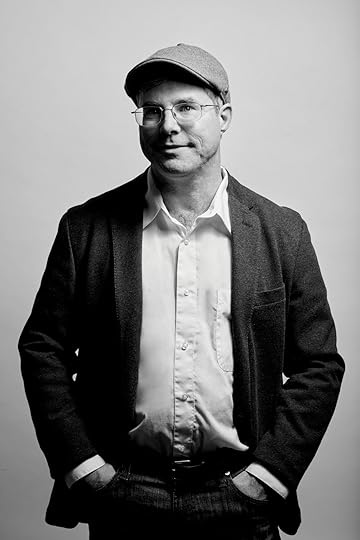
Photo credit: Aubrie Pick
Andy was born in 1972 in Davis, CA, a suburb of Sacramento, to a particle physicist father and an electrical-engineer mother. He grew up reading science fiction, and starting at the early age of fifteen, worked as a computer and video game software programmer for a variety of companies.
With a mind fluent in science and an itch for writing, Weir delved into comics, short stories, and other writing projects through his twenties and thirties. His first published work was a short story titled, The Egg, published in 2009, setting him on his path as an author. He developed an online fan base, and though rejected by the traditional publishing industry, Weir persevered with his writing.
The Martian was initially a serialized story published free on his website and drew interest from a burgeoning reader base, including scientists, eager to suggest solutions as to the ‘how’ of a human marooned on Mars. The serial was a hit, and with fan pressure, he self-published the novel on Amazon Kindle for 99 cents, and The Martian quickly rose to the Kindle bestsellers list.
With proven sales, Weir was approached by a literary agent, then picked up by Crown Publishing Group, and the print version of the novel debuted at #12 on The New York Times bestseller list. The Martian film, based on Weir’s novel, was produced by 20th Century Fox, directed by Ridley Scott, with Drew Goddard adapting it into the screenplay. Starring Matt Damon as the affable and self-reliant Mark Watney, the film was released in 2015 to rave reviews—and changed Weir’s life.
Weir’s latest novel, Artemis, is a near future thriller set in a small colony on the Moon at the end of this century, with a female protagonist snagged into a nefarious web of corruption, and launched on November 14th, 2017.
K.E. LANNING INTERVIEW WITH ANDY WEIR:
What are the primary influences in your writing, such as authors you’ve read, or significant events in your life?
I grew up reading my dad’s sci-fi collection. So I read a lot of Baby-Boomer sci-fi despite the fact that I’m a Gen-Xer. So my idols and role models are Robert Heinlein, Isaac Asimov, and Arthur Clarke.
What led you to become an author? Was there a specific epiphany you can tell us about?
I never had any specific “aha” moment. It’s just something I always wanted to do. But I didn’t think I’d be able to make it against all the competition so I went into computer programming instead. I did have a three-year sabbatical where I wrote a book and tried to get it published, but I didn’t get any traction. So I went back to programming and wrote as a hobby. That’s where The Martian came from, and I ended up able to follow that dream after all.
Can you give us some insight into your writing process?
I like to set myself a word-count goal. I know, it’s a beginning-writer thing to do, but remember I really am still a beginning writer. One success doesn’t suddenly make me a wise old sage.
I’m a fundamentally lazy person, so my biggest challenge is motivation. I have to force myself to write and get stuff done or I’ll put it off and put it off. I write in my home office, which means there are all sorts of distractions around that I would much rather do. I’m into woodworking and my garage is just 20 feet away. I have cats that love attention. That sort of thing.
So I make “rules”. Like “No woodworking until I’ve made my 1000 words”. And “No TV or YouTube either.”
The science fiction genre is broad—your writing seems to be more on the traditional science fiction end and not as much on the social commentary/speculative end of the spectrum. Can you discuss this?
I dislike social commentary. Like… I really hate it. When I’m reading a book, I just want to be entertained, not preached at by the author. Plus, it ruins the wonder of the story if I know the author has a political or social axe to grind. I no longer speculate about all possible outcomes of the story because I know for a fact that the universe of that book will conspire to ensure that the author’s political agenda is validated. I hate that.
I put no politics or social commentary into my stories at all. Anyone who thinks they see something like that is reading it in on their own. I have no point to make, and I’m not trying to affect the reader’s opinion on anything. My sole job is to entertain and I stick to that.
To that end, I also don’t talk about my personal political opinions publically. I don’t want readers to even know, honestly. I don’t want that in the back of their minds as they read my stuff.
I totally respect your personal views, but you had also mentioned Heinlein, Asimov, and Arthur C. Clark as influences. Heinlein in particular delves into social commentary in such books as Stranger in a Strange Land. And there are many classic sci-fi novels in which the author creates dystopian universes to comment on the human condition, such as Brave New World, 1984, The Handmaid’s Tale, etc.
Yeah, I didn't really like the political message aspects of those stories. Not that I disagreed with the political point. Just that I didn't like the political points being there at all. Now, those writers are so good they make compelling and addictive stories *despite* the political messaging. But that's often not the case with other stories and other authors.
You're not mis-reading me, though. I deeply dislike social commentary. For instance, as a lifelong Star Trek fan, it's always bothered me that there is a presumed "responsibility" within Star Trek shows to talk about social issues. I just want to watch Romulans and the Federation shoot at each other.
I'm not saying anyone else should hold my view. Many readers select books specifically for their social commentary. There's no "wrong" way to enjoy a book. But in the end, as a writer, I can only do my best to write books that I would enjoy reading. So, for me, that means no politics.
It’s very effective, but why did you choose the first person, journal format to write The Martian?
The Martian required a huge amount of exposition to work, and there’s no way that could happen without humor. I had to have someone explain it in a funny way or it would read like a Wikipedia article. Also, since Mark was alone, there would be no other way for the reader to know what was going on in his mind unless he told them.
Mark Watney’s character in The Martian, reveals a heroism and humanity at the deepest level. How did you develop his character?
Mark is basically me. But he’s the distilled, idealized version of me. He has all the qualities I like about myself and none of my many flaws. And he’s better at all the things I’m good at. He’s what I wish I were.
The thread of exploration and colonialism is common in both The Martian and your new novel, Artemis, which is set in a colony on the Moon. Can you flesh out this theme?
Artemis takes place in the late 21st century, maybe 70 years in our future. The titular city is humanity’s only city on the Moon. I put a lot of work into figuring out why there would even be a city on the Moon and how their economy works. It’s a frontier town with a heavy emphasis on the tourism industry. I tried to be realistic on what kinds of people would be there, and how their society would gel.
Can you give us some background on your new novel, Artemis?
Jazz Bashara has lived in the lunar city of Artemis since she was six years old. She’s a bit on the shady side, augmenting her meager income with smuggling. She gets an offer from a local business magnate to do a very illegal sabotage job and the payoff is too big to ignore. Of course, things go wildly awry (wouldn’t be a heist story if they didn’t) and Jazz finds herself in mortal danger as the very powerful people she angered come after her.
How did you develop the character of Jasmine Bashara, the protagonist of Artemis?
I came up with the city itself first. The economy, the technology to make it, how it was built, etc. After that, I set about inventing a story to take place there. In the first story idea I had, Jazz was a very tertiary character. I needed a smuggler so I picked a fairly random country for her to be from (I ended up with Saudi Arabia) and rolled with it. Jazz was kind of a funny side character but that was it. However, that story concept didn’t work out well and I abandoned it.
Then I came up with a completely different story idea, and this time Jazz was more prominent. She was still a secondary character, not critical to the plot, but was interesting. That story also fell flat.
I realized that the most likable thing about both of those concepts was Jazz herself. So I took a stab at writing a story that revolved around her personally. And that’s what became Artemis.
Since the launch of Artemis, there have been some critical reviews of your main character, Jazz. Can you comment?
Jazz is a complex, very flawed person, who often makes bad life decisions. It's a fine line you have to walk when making an anti-hero. You need them to be "bad" but not so bad that they lose the audience. It's easy to alienate the reader from the protagonist if you do it wrong. Many readers had a hard time rooting for her. I can understand that, and I'll learn from the experience. I pay very close attention to the feedback I get - I'm always trying to get better at what I do.
However there is a minority of people who view everything through a lens of social issues. And they're more focused on Jazz's gender then they are in any other part of the story. Many consider it wrong of me not to focus on social issues in the book - as if simply having a female lead means I had some responsibility to make it about her gender. That's not how I write, so I don't think there was anything I could do for people who want that kind of story.
And finally, there's feedback about my portrayal of a woman. It was a challenge for me to write a female protagonist, and I did my best. But there are certainly going to be places where it doesn't quite ring true. Some critiques of the book point out those parts and I try to learn from them. However, there are also female readers who assume Jazz should think and act exactly like they do, and get mad when she doesn't. The challenge is separating the legitimate critiques of the female voice from people who can't accept that a woman who grew up on the moon in the late 21st century might have different attitudes than a contemporary American woman would.
How has your success as an author changed your life and what’s next on the horizon for you?
Well, I have a lot of money now. So I moved into a nicer house. :)
But other than that, not a lot of change. I’m still the same me, with the same friends and hobbies. I plan to continue writing as long as people keep buying my books. I would love for Artemis to become a series. We’ll see if it’s received well enough to warrant sequels.
Best of luck, Andy!
My sincere thanks to Andy Weir for graciously agreeing to my interview and to Sarah Breivogel of Penguin Random House for all of her help!
K.E. Lanning, Author of A Spider Sat Beside Her, and The Sting of the Bee [2018 release]
This article can also be found on FUTURISM
October 26, 2017
Speculative Fiction: What the HELL is it?

Thomas More and Utopia
As in any advent of a new species, the birth of the science fiction genre led to an evolution of novels ranging from Thomas More’s Utopia to Andy Weir's THE MARTIAN.
However, when a genre becomes so diverse that readers are uncertain as to whether the book they are interested in is a high tech detective story set on a spaceship or a deep dive into the political shenanigans of a warped future society, then perhaps it is time to shake up the genre for clarity. By some definitions, speculative fiction (spec-fi) is characterized as an umbrella description of the broad spectrum of science fiction and fantasy, but the term first appeared as a genre reference in 1947 in an editorial essay, On the Writing of Speculative Fiction, by the venerable sci-fi author, Robert A. Heinlein.
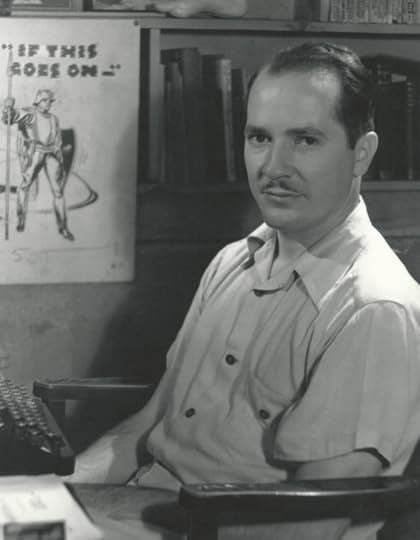
Robert Heinlein
An excerpt from his essay:
There is another type of honest-to-goodness science fiction story that is not usually regarded as science fiction: the story of people dealing with contemporary science or technology. We do not ordinarily mean this sort of story when we say "science fiction"; what we do mean is the speculative story, the story embodying the notion "just suppose—" or "What would happen if—." In the speculative science fiction story, accepted science and established fiefs are extrapolated to produce a new situation, a new framework for human action. As a result of this new situation, new human problems are created—and our story is about how human beings cope with those new problems.
A major influence in my own writing, Heinlein wrote social commentaries such as Stranger in a Strange Land and I Will Fear No Evil. In The Moon is a Harsh Mistress, Heinlein writes a chilling account of a revolt in a penal colony on the Moon, and contributes the formulation of his heroic archetype to author Ayn Rand’s protagonist, John Galt, in Atlas Shrugged, known for its political views.
Heinlein was a mentor to the great Ray Bradbury, one of the quintessential science fiction authors, yet his novels such as Fahrenheit 451 are closer to the speculative fiction end of the sci-fi genre. In a 1982 essay, Bradbury wrote, "People ask me to predict the Future, when all I want to do is prevent it."
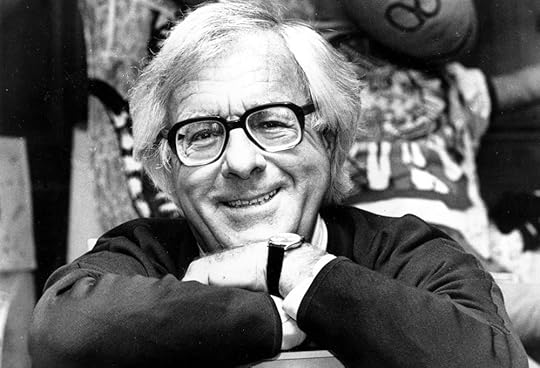
Ray Bradbury
The sci-fi author, Octavia Butler, explores the human condition via time-travel in her novel, Kindred, in which her protagonist, a young African American woman, Dana, is transported from modern California to the pre-civil war South to save a young white boy from drowning. As the story progresses, Dana is swept back and forth in time, seeing the boy harden into a slave master as he grows older, and experiencing the way slaves are conditioned to bondage by their cruel subjugation.
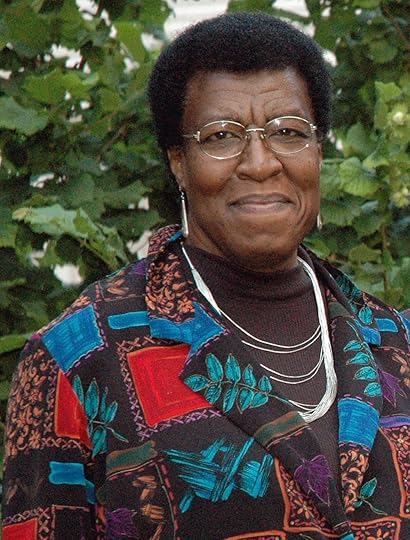
Octavia Butler, photo credit Leslie Howle
In a recent interview, I asked the renowned author, Margaret Atwood, about the term science fiction and the confounding breadth of the genre. Atwood believes her work, such as The Handmaid's Tale, and other authors utilizing social and/or political commentary or examining the vicissitudes of humanity, should be termed speculative fiction, rather than science fiction.
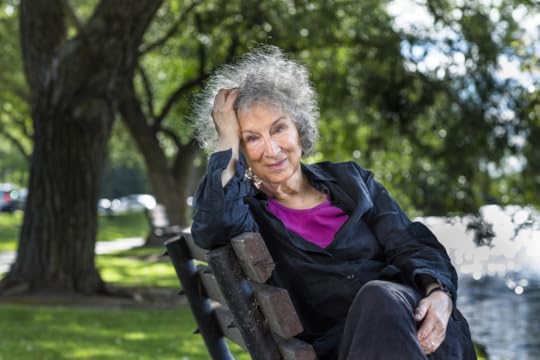
Margaret Atwood in K.E. Lanning’s 2017 Interview [updated with the Emmy Awards]:
…We could just call it [sci-fi and speculative fiction] two different things. We can call it apples and oranges. Apples take place on other planets and have spaceships in them, and oranges take place on planet Earth and have to do with what we're doing here now and only the technologies that we already have got our hands on. There's a difference in kind between those two things. I know that when I go to the sci-fi shelf, I expect there to be other planets. To avoid disappointment, because when I buy a package of bran flakes, I want there to actually be bran flakes in the box—to avoid disappointment, I feel they [spec-fi] should be called something else.
The designation of speculative fiction, focusing on social commentary rather than technology, regardless of the novel's time frame, could encompass literature such as Brave New World by Aldous Huxley, 1984 by George Orwell, The Lathe of Heaven by Ursula K. Le Guin, and the WOOL Omnibus series by Hugh Howey—all speculating on the human condition within dystopian, apocalyptic, or post-apocalyptic worlds in order to highlight the existence—and the danger—of political corruption and social crises.
For readers’ sake, is it time to consider whether speculative fiction should be a separate genre, or at a minimum, have equal billing to science fiction and fantasy—to elucidate what’s between the covers of that book?
K.E. Lanning, author of speculative fiction: A Spider Sat Beside Her, and The Sting of the Bee [2018 release]
This article was first published on FUTURISM, October 19th, 2017: Speculative Fiction: What the Hell is it?
The original Margaret Atwood 2017 interview and the trailer for the Hulu series is available online at FUTURISM. This interview was edited and condensed for clarity.
September 18, 2017
Margaret Atwood: 2017 Interview & The Handmaid's Tale at the Emmys
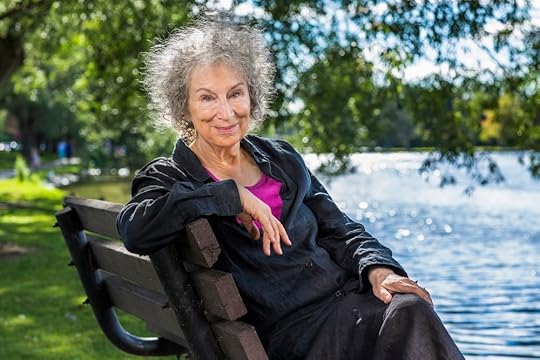
Margaret Atwood by photographer Liam Sharp
Margaret Atwood is a poet, a novelist, and an inventor. She was born in Ottawa, Canada in 1939 to Margaret (maiden name Killam), a nutritionist and to Carl Atwood, an entomologist. With her father’s research in entomology, her early childhood was spent deep in the forests of Canada. Always a voracious reader, she knew by the age of sixteen that writing would be her vocation. Atwood graduated in 1961 with a Bachelor’s degree in English from Victoria College in the University of Toronto, and in 1962, received a Master’s Degree from Radcliffe College, Cambridge, MA.
In 1961, she won the E.J. Pratt Medal for her book of poems, Double Persephone. Atwood has also been a writer of feminist works such as The Edible Woman, published in 1969.
In Atwood’s speculative fiction (literary science fiction) novel, The Handmaid’s Tale, published in 1985, she skillfully delivers a terrifying tale of a female protagonist caught in a wretched social and political nightmare within an authoritarian theocracy set in a future New England. In 1987, she won the first Arthur C. Clarke Award for this stunningly written novel.
Atwood’s latest novel, MADDADDAM, was published in 2013, completing the trilogy started by Oryx and Crake, in 2003, and followed by The Year of the Flood in 2009.
On par with Aldous Huxley’s Brave New World, and George Orwell’s 1984, Atwood's poetic prose is timeless, dissecting the accepted norms of society, politics, and the human condition. In a quote from The Handmaid’s Tale, Atwood’s protagonist Offred says, “We have learned to see the world in gasps,” a stark warning to never become complacent in our freedoms.
Margaret Atwood is an extraordinary person—a thinker and a story teller, using her literary talents to challenge our beliefs, carrying us on an allegorical ride through dystopian worlds facing environmental disasters and societal extremes—revealing the fragile nature of our humanity.
Hulu's The Handmaid's Tale
Hulu's new series, adapted from Atwood’s classic dystopian novel, The Handmaid’s Tale, is set in the near future when the totalitarian society of Gilead has come to power in the northeastern United States. Facing environmental disasters and a plunging birthrate, Gilead is ruled by a twisted fundamentalism in its militarized “return to traditional values.” As one of the few remaining fertile women, Offred (Elisabeth Moss) is a Handmaid in the Commander’s household, one of the 'caste of women forced into sexual servitude as a last desperate attempt to repopulate the world. In this terrifying society, Offred must navigate between Commanders, their cruel Wives, domestic Marthas, and her fellow Handmaids – where anyone could be a spy for Gilead – all with one goal: to survive and find the daughter that was taken from her.
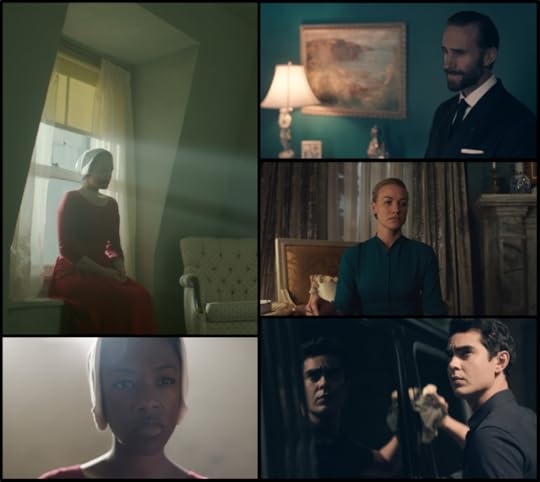
Photo credit: Hulu
Hulu's production of The Handmaid's Tale was a HUGE WINNER at the 2017 Emmy Awards:
Outstanding Drama Series, Outstanding Lead Actress in a Drama Series [Elisabeth Moss], Outstanding Supporting Actress in a Drama Series [Ann Dowd], Outstanding Writing for a Drama Series [Bruce Miller], and nominated for Outstanding Supporting Actress in a Drama Series [Samira Wiley]
K.E. Lanning Interview with Margaret Atwood April 10th, 2017 [text]
K.E. Lanning: It's really an honor to speak with you—I appreciate your time.
Margaret Atwood: Thank you.
I'd like to start at the beginning. In reading your bio, your father was an entomologist, so you spent a lot of your early years with your family in the forests of Canada. Why don't you tell us a little bit about your childhood and any significant events that shaped you as an author.
Well, you never know these things. It was a reading family because there was no electricity and we were not getting any TV. In fact, nobody in the late forties was getting TV much at all yet. Radio; we could get Russia on shortwave, for what that was worth. Basically, it was reading, drawing, and writing.
I was an early reader, and there was never a book around that I was told I couldn't read. That would include everything from detective thrillers to biology textbooks, to sci-fi, because of my dad, as a scientist, got a kick out of sci-fi. He had early classics around, such as Karel Čapek, Brave New World, and HG Wells.
I myself continued on in the fifties with Ray Bradbury as he published, and John Windham also as he published.
Recently, I did a list of dystopias for Omnivoracious, on Amazon and Goodreads.
As kids, we were into rocket ships and other planets, and all of those things that I suppose really started with Flash Gordon and A Princess of Mars, War of the Worlds, those kinds of books in the early part of the century. That turned into Weird Tales and other magazines of the thirties.
We had the funny papers. On the weekend, there would be a supplement and a lot of well-loved comics. It was also the age of comic books in the late forties—the golden age of superheroes. Not just Batman, Superman, Wonder Woman, and Captain Marvel, but a whole bunch of other ones.
It was such a great golden age of [comics].
That's what people think now, but at the time they just thought it was bad for you, and that children shouldn't read them. That's when the comic’s code came in, but unfortunately for them, it only applied to colored comics, and you could still get the crime and horror in black and white.
They felt it wasn't as bad in black and white?
I don't know what they thought. It was actually worse. It didn't look as fake.
I was also reading that by the age of 16, you had already decided that writing would be your profession.
Vocation. There wasn't any chance of it being a profession, a profession for which you got paid. This as Canada in the fifties, you have to understand. You didn't expect to actually make any money out of it, so I had a brief flirtation with something called Writer's Magazine in which they listed in the back all of the places where you could sell things to magazines. The thing that paid the most was true romance, so I thought maybe I would write true romance in the day, and then in the evenings I would write my literary masterpieces, but that did not go very far because I wasn't actually up to the task. I could not do the vocabulary, which included at that time a lot of asterisks, and sentences like, and then they were one..... That I could not do. Things happened on sofas in those magazines.
These would be the stories in which there would be two male suitors, one would work at a shoe store and the other would have a motorcycle, and you just know what happens then. Wuthering Heights, only in modern setting.
You've gone over some of the writers that you enjoyed as a kid, but I was wondering, are there any other authors that you consider primary influences to your writing?
Apart from the fact that I read all of Edgar Allen Poe at too early an age—it was in the children's library section because it didn't have any sex in it. Who made that decision? I understand now because I just did an introduction to a book of his. Ray Bradbury did the same thing—Poe was an early influence. I don't know whether you've read all of Poe, but some of it is terminally gruesome.
I know that in some of your discussions you've talked about having elements of environmentalism and humanism in your work. I was just curious [on your thoughts].
I would say environmentalism I grew up with—it's just part of biology. I'm not sure what humanism mean? I've never quite known.
The definition of humanism changes through history. In some definitions, it's sort of an acceptance of you as a human and accepting everything about being a human, and not necessarily being obsessed with religion to the point of conflict with our humanness.
I'm a strict agnostic, by which I mean there's a difference between what you can know, which has to do with the physical world, and what you can't know. What you can't know remains an open question. Those things are a matter of faith, and there's just a difference between faith and knowledge.
Yes. I think that when you have a religion that carries a club to beat the human out of you, then there's something wrong with it.
But that's just one use of religion. It's a narrative subset, by which I mean you can tell by looking at what kids do under the age of three or four what's in the human package. We know that language acquisition, and music and rhythm, and storytelling, and visual imagery—kids will do that very readily. They just pick it up.
A narrative, something that only human beings do, started pretty early to tell stories about where did we come from and what happens to us in the future, and Rover the dog will never do that. Rover the dog will never say, as far as we know, what was the origin of dogs, where did dogs come from, and will never say what will happen to me personally, Rover, when I die. But human beings do that all the time.
There are all of these different narratives, and there have been very many of them, and because there have been very many of them, it's no good saying to people you shouldn't do that because it seems to be something that people do. If there shall be religion, which it appears that there shall be, let's hope that it is a good one, and not used as a hammer.
You probably say, well they're [ideologies]are a form of religion, or you could say that religions are a form of ideology, whichever you prefer, but when there is a belief system that gives you the permission to kill other people who don't share it, that's the negative aspect. But let us not be blind to the fact that there are positive aspects.
It's one of the things that sci-fi does all the time, makes up other religions.
Speaking of science fiction, I was interested in a discussion that I read that you were talking about the term science fiction as a genre, and the difficulty with that, and you feel like that what your work is speculative fiction.
Or we could just call it [sci-fi and speculative fiction] two different things. We can call it apples and oranges. Apples take place on other planets and have spaceships in them, and oranges take place on planet earth and have to do with what we're doing here now and only the technologies that we already have got our hands on. There's a difference in kind between those two things. I know that when I go to the sci-fi shelf, I expect there to be other planets. To avoid disappointment, because when I buy a package of bran flakes, I want there to actually be bran flakes in the box, to avoid disappointment, I feel they should be called something else.
I agree. I've had definitely difficulty with that myself. I think it's really more, from what I've been able to tell, agents and publishers that are more interested in keeping it within a genre to a certain extent.
As booksellers, they want to know what shelf to put it on. Which is annoying—Ursula Le Guin has quite a lot to say on the subject and I would agree with her that there are not bad genres, there are only bad books.
Margaret, one of the things I was really interested in is the fact that you're both a poet and a novelist. Really, your poetic prose is just stunning. I was wondering if you could just discuss a little bit your journey as a writer.
I don't know whether I have one. I'm so old that there were no creative writing schools.
I think Iowa had started, and in the early sixties one at the University of British Columbia had started, but that was it. We were not encouraged to think in terms of my journey as a writer. We were not at all encouraged in that direction. We were encouraged, if anything, if you were in academia, encouraged not to let on.
People a generation before mine had done things like gone to Paris. In the thirties, people would go to Paris. People of my generation were pretty much led to understand, and this is Canada in the late fifties, that if you wanted to be an artist you needed to go to New York or London. If you were from Quebec, you needed to go to Paris.
Being perverse, I thought maybe I would go to Paris and live in a garret, drink absinthe, smoke, and get TB, and write masterpieces and work as a waitress, but that didn't happen. Although I did later work as a waitress.
It was not about my journey as a writer. It was about how do I support myself if I want to do this? That was what it was about. Then do you get a job that has something to do with writing, in which case you might use up all your writing energy doing that job, or do you get some other job that is not related? People have done both, like working in a bank and being a real estate agent or something.
In my generation, in the sixties in Canada, there weren't very many women writers, and writers were told things by other writers such as, in order to really understand the world, you have to be a truck driver. Except for me. As far as I know, they're not hiring girls yet. Anyway, I can't drive, so it was like that.
I think my journey as a writer consisted of not doing what other people told me I should do.
You really craft your characters very well, and I don't know if you could comment a little bit on how you're approaching your character development.
I think that people in sci-fi are people. Maybe you should try to make them as much like people as possible, unless they're of course an altered life form, in which case you make them like that. I don't think there's any big mystery to it. There was an age of sci-fi, I guess hard rocket ship sci-fi, that I wasn't terribly interested in. I was always more interested in people-centered stories, some of which were just pretty much fantasy under another name. They could all be classed as wonder tales, things that are not going to happen in real life. Under that huge umbrella you could put vampire stories, and werewolf stories, and Frankenstein, though we're getting a bit closer to that, Frankenstein and R.U.R (Rossum's Universal Robots) and all of them, you can call them wonder tales, but they do deal with age-old motifs. I think that a lot of sci-fi got its main stories from mythology.
That's a good observation.
I'm not alone in thinking that. It's not an original thing with me.
One of your extraordinary books is The Handmaid's Tale, which was made into a film in 1990, and now Hulu has developed a series based on that novel, releasing on April 26th. I'm just curious how you feel about your work being adapted to the screen and how involved you've been in the process.
I worked in film and television in the seventies quite a bit, so I know the pitfalls and challenges, and in what ways a novel is not the same as a film or television. Right now we're in an age in which the well-produced series has really carved out a chunk, and it allows you to explore a longer work in depth, and follow characters in ways that you would not be able to do in a 90-minute film.
Whenever a new platform comes along, there's a huge burst of creativity as people explore it and build it out, and that is certainly happening right now.
I saw the trailer, and it looks really interesting.
Yes. I think in my opinion, it's pretty strong. If we're letting me be less Canadian about it, it's very strong.
I had an American writer friend who came up here and he said, they don't like my book. I said, they loved your book. He said, how can you tell? I said, the thing is that ‘not bad at all’ in Canadian is the equivalent of American, ‘best thing since sliced bread’, ‘stupendous’, ‘magnificent’, ‘never been equaled’. It means the same.
You have to have the Canadian to American translator?
Yeah. I think some of the poor Americans need it, whereas the Canadians, of course, if they go down there, they think they've been elevated to the status of a god.
Speaking of that, you are a real icon of the literary world, and I was just curious, what do you feel is your legacy?
Are we talking about me being dead now? Is that the subject?
We're trying to get the words down before then.
You never actually know until you are dead, and you probably aren't going to know that either, but other people will know.
Legacies come and go, because everybody is always in the present moment, so it's a bit presumptuous to say that you will have a legacy that will be the same forever and ever because it won't be. Typically what happens when somebody fairly well-known dies is there is a bust of interest in their work, and then it either sinks into oblivion, never to be seen again, or it sinks into oblivion and then makes a comeback a little bit later.
Is there any message that you have tried to put forth [in your writing]?
How we were taught poetry in high school, we were taught what is the poet trying to say, which meant that we thought, why do they have to spend all those words if what the poet was trying to say was war is hell? Why couldn't they just blurt it out instead of putting us through a sonnet?
I don't go in for telling the reader what the message is, because everybody reads in an individual way, and takes away something that has something to do with what they brought to it, or let us say that the reader is the violinist of the book. Every reader is reading the same book, but each interpretation of that book is going to be different, so I strenuously avoid telling the reader what I prescribe the message to be, since my job as a writer is making a world that is as complete as I could make it.
I did write a book called originally Negotiating with the Dead, but the publishers were put off by the dead word and changed the title to A Writer on Writing. Squeamish, aren't they? In the beginning, in the introduction I said, first of all, I tried to figure out what all of these writer's motives were, dead writers and living ones, and it was everything from to justify the ways of God to man, or to get back at the people who were mean to me in high school, or it could be both. I think my favorite was a Czech writer who said, “I want to make a boudoir so that the reader can go into it and have fun.” I thought, that's no good.
There's a big leap between a boudoir for fun and to justify the ways of God to man. Instead, I asked myself, and dead and living writers, what's it like to go into a book? I was looking at the beginnings of things, and everything from, I was wandering in a dark wood to Virginia Woolf saying writing a novel is like going into a dark room and holding up a lantern which illuminates things that were already there. All of the answers had something to do with going into the dark and illuminating something.
That's what writers do, in my opinion. You go into the dark, you go into an unknown, which is the thing you're trying to write, and then you attempt to illuminate it and bring something back into the light.
That's wonderful. I love the way you say that.
I believe I heard that you're writing a new novel. Is that correct? Is that what's next on the horizon for you?
I'm very cagey about saying what I'm doing. Once upon a time I did say what I was doing, and then, of course, I didn't do it, and I got an endless number of questions. But you said you were going to do that, why didn't you do it? There's no point saying what you're going to do until you've actually done it. For the same reason, I never actually tell my publishers what's going to be in my next book, because they would probably make horrified sounds. They usually want you to write the book you just wrote.
Margaret, I really appreciate you taking the time to speak with me, and best of luck!
My sincere thanks to Margaret Atwood for graciously agreeing to my interview, and to Lucia Cino, Melinda Casey, Lauren Thorpe, and Phoebe Larmore for all of your help.
K..E. Lanning, Author of A Spider Sat Beside Her, and The Sting of the Bee [2018 release]
The interview and the trailer for the Hulu series is available online at FUTURISM. This interview was edited and condensed for clarity.
A Spider Sat Beside Her
By K E Lanning
September 17, 2017
CIXIN LIU
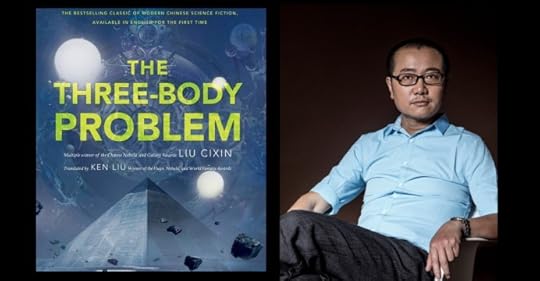
Photo courtesy of Tor Books
Liu Cixin [writing in English under the name, Cixin Liu] is a science fiction writer from China; a nine-time winner of the Chinese Galaxy Award (Chinese Hugo) and the Xing Yun Award (Chinese Nebula), and the first Asian to win a Hugo Award, in 2015, for his work, The Three-Body Problem (translated by sci-fi author, Ken Liu, and published by Tor Books.
Now a sci-fi film has been finished for The Three-Body Problem. https://www.youtube.com/watch?v=ZqYSpTOshVQ
So who is Liu Cixin? He was born in 1963 in Yangquan, China, during that country’s Cultural Revolution—a major influence in his life. His parents worked in a mine in Shanxi, but sent Liu to live in his ancestral home in the Henan province to escape the violence in the country. Liu was educated at the North China University of Water Conservancy and Electric Power, graduating in 1985, and then worked as a computer engineer. [primarily sourced from Wikipedia]
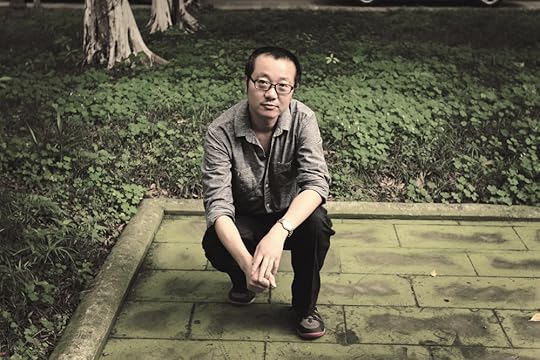
He’s an engineer by training, but what was the spark for Liu to write speculative science fiction?
As a scientist, a longtime reader of science fiction, and now myself a science fiction author, I embrace the idea that science and art are two sides to the same coin. In Liu’s novels, physics becomes poetry and his characters reveal vulnerable souls, lost in a shifting world they can’t truly grasp, but who remain determined to be true to themselves.
His characters travel through a procession of spectacular worlds, strung like pearls along a silk cord, harkening back to the intricate creations built by sci-fi writer, Arthur C. Clarke. Josh Rothman of The New Yorker wrote a lovely article on Liu Cixin: http://www.newyorker.com/books/page-turner/chinas-arthur-c-clarke
Through his writings, Liu Cixin reveals an amazing mind, using science as both a physical and creative force, imagining worlds in which humans are never sure where the fate of the universe will leave them.
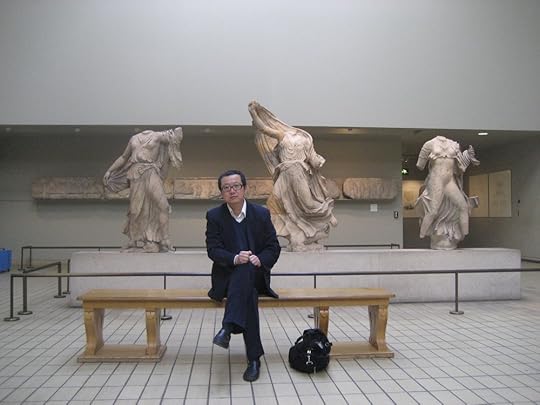
Cixin Liu Interview with author K.E. Lanning
You were born during the turbulent time of the Cultural Revolution in China. Your parents worked in the mines of Shanxi, but you were sent to live in the Henan province to escape the violence. Can you tell us about growing up in that difficult period in China and how it affected you as a writer?
As a child, I witnessed a great deal of violence and persecution as well as social unrest during The Cultural Revolution. These are all mass movements, which, at some point, made individuals uncontrollably crazy, just like Gustave Le Bon in The Crowd as he was described in the book. This experience has made me understand the complexity of human nature and society—I’ve realized that the future of human civilization is also full of danger and uncertainty. Such understanding is manifested in my science fiction novels like The Three-Body Problem.
Do you feel that you are a driven person and what specifically drives you?
I was quite curious about the unknown world and was full of yearnings for the vast universe, and it was this wonder and desire that drove me to write science fiction. I’ve tried to describe the relationship between man and nature and the universe, using imagination to expand my existence.
Physics is the elemental language of the universe and you weave it into your writing like poetry. Can you discuss your love of physics and the role it plays in your works?
Physics is the science to understand the fundamentals of the world and it explores the deepest mysteries of nature and the universe. The world described by modern physics has already moved far beyond our common sense and intuition, even beyond our imagination, and this is, of course, the richest resource for science fiction. I’ve tried to turn the magical world as demonstrated by modern physics into vivid stories. Most of my stories were based on and imagined along the lines of physics and cosmology.
What are the primary influences specifically in your writing, such as authors you’ve read?
The writer who has influenced me the most is Arthur C. Clarke. His 2001 Space Odyssey revealed the breadth and depth of science fiction imagination and thinking. Clarke also wrote Rendezvous with Rama, showing the ability for science fiction to create an imagined world. The entire work is like the Creator’s giant blueprint depicting an intricate world in which each brick is delicately done. Another influential writer to me is George Orwell, whose 1984 provides a panoramic description of a possible future societal state, showing the ability of science fiction literature to reflect the reality from an angle unavailable to traditional realism.
World building seems to be a central thread through your stories—what is the impulse of creating these intricate worlds?
When I was just a reader of science fiction, what attracted me most to the science fiction genre was the multitude of imagined worlds it had created, which expanded the narrow breadth of my life. Now that I have become a science fiction writer myself, “world building” has become a primary direction for writing.
Western culture experienced the rise of the individual during the Renaissance, but in Chinese culture, responsibility for the greater good of society carries more weight than the individual. Through your characters, this strand appears to carry through your work. Can you discuss this?
The liberation of humanity after the Renaissance is, of course, a huge progress for human civilization. In the modern world, it is the trend for the development of human society to be people-centered, and this is certainly a bright direction. Even in China, where there still exist various problems in this regard, it is also the general direction of development.
But what needs to be pointed out is the fact that the worlds described by science fiction are invented by the author. In the science fiction stories that I have written, there is a huge difference between the fictional world I have crafted and the real world. The fictional worlds I create are worlds in which humanity is in crisis or facing calamity, and some worlds are on the verge of extinction.
A social system is inseparable from the environment in which a society finds itself. Under such circumstances, there would need for a suitable and adaptable system. To face a calamity, it might be possible that collectivism may once again become a mainstream view on values.
Your trilogy, Remembrance of Earth’s Past, though primarily dystopian, has elements of hope, as it claws through the social and political side of human nature and our place in the universe. Is that correct and can you discuss this?
As to the future of humanity, I’m essentially an optimist. I believe that with the advancement of technology, mankind has a hopeful future. But this optimistic view is based on reason: on one hand, whether the future will be bright or be dark depends largely on the choices we make today. I think human beings are capable of finding a reasonable and correct choice for the direction of their development. Underlining that truth, the world walked away from destroying itself in a nuclear war during the last century.
But there also exists the possibility of a wrong choice. Human civilization may face all kinds of crises, which might come from changes of the Earth’s environment or from outer space, i.e., encountering extraterrestrial civilizations.
Therefore, the future in my eyes is bright, although it is full of all kinds of challenges and pitfalls. A positive future can only be obtained through human effort, striving towards the greater good.
In Death’s End, I felt a strong sense that much of the character development of Cheng Xin and Yun Tianming stem directly from you as a person. Can you comment on that?
The characters in my novels have little to do with my own life. When I was portraying these characters, I rarely put myself into them. They are more like some kind of signs or symbols and their character development is mainly dictated by the need of the story.
It’s fantastic that The Three-Body Problem has been made into a film. How do you feel about seeing your work adapted to the screen? How involved were you in the adaptation of the screenplay?
I am naturally pleased that my own novels can be made into films, but in China, we still lack experience in making science fiction movies, especially those big-budget science fiction films such as The Three-Body Problem. It’s a challenge to be successful the first time. Therefore, I take it calmly, viewing it only as a good start for Chinese science fiction movies. I have participated a lot in the shooting of the film, mainly in the areas where a science fiction writer excels, such as script production, or design of concept for special effects and other things.
Can you give us a hint of what is next for you?
I am working hard at writing my next novel, and my plan is to make the new novel different from The Three-Body Problem in terms of its theme.

With an allegorical spotlight, Liu Cixin’s trilogy of The Three-Body Problem, The Dark Forest, and Death’s End, illuminate the deep political and social issues in our world, in a desire to make sense of our common humanity and our place in the universe.
In a lyrical quote from Death’s End, Liu writes: “The ultimate fate of all intelligent beings has always been to become as grand as their thoughts.”
But the question remains—what if someone out there in the universe answers our call?
My sincere thanks to Liu Cixin for this interview, to Desirae Friesen at Tor Books, and to Hongchu Fu, for aiding in translation.
Also published at: https://futurism.media/in-the-authors-universe-interview-with-sci-fi-author-cixin-liu on May, 2017
K..E. Lanning, Author of A Spider Sat Beside Her, and The Sting of the Bee [2018 release]
August 12, 2017
Hugh Howey
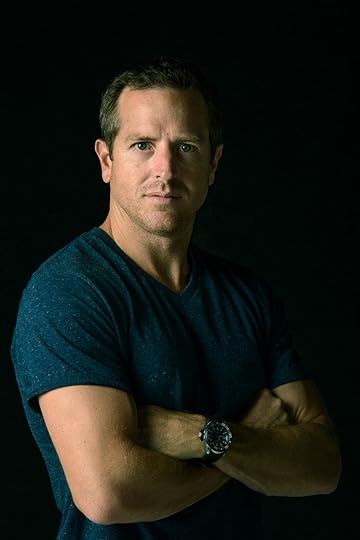
Hugh Howey is an author of science fiction and whatever else he wants to write about—as an independent author—he controls his writing career.
Born in 1975, Hugh grew up reading and sailing, navigating away from a traditional childhood of spiritual and physical boundaries. After a stint in college, where he studied English and physics, he dropped out to renew his connection with the sea. Marriage brought him to dry land once again, where he pursued his other passion—writing.
With his breakout novel, WOOL, Hugh Howey
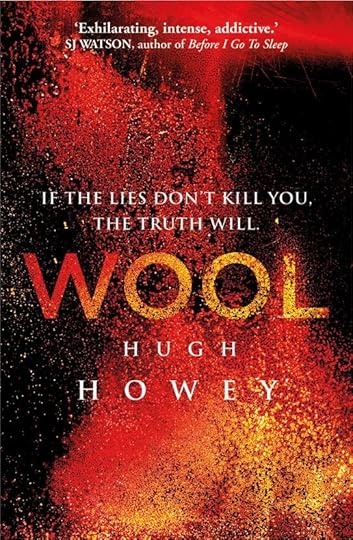
became an international bestselling author, leaping onto the New York Times best seller list. The complete trilogy of WOOL , SHIFT, and DUST have been published, completing the omnibus series.
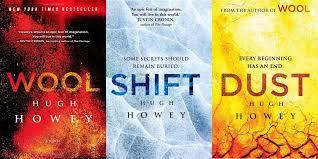
Wool Omnibus (Silo Series)
I was fortunate to catch Hugh for an interview—in the middle of the Pacific Ocean.
Hugh Howey Interview
by K.E. Lanning
I read in an interview by John Biggs during which you described yourself as a vagabond, or I might describe it as a “free human” in a sense. Can you flesh that out?
The only way I could sit still as a kid was with a book in my hand. If my body wasn’t moving, my thoughts needed to race. I guess not much has changed. I like the novel in life (pun intended). Being in one place too long makes time start to flow quicker and quicker, until years have zipped right by.
I used to think no one place could ever feel like home, which is why I thought of myself as a vagabond. But I’ve learned over the years that every place feels like home to me. I’ve always been lucky in this way: I can insert myself into almost any situation or conversation and feel perfectly at ease. When I started traveling on book tours, every country and state I visited felt like a place I could settle down for years. This doesn’t make me want to settle, though. It makes me want to see the next place that I could call home.
Do you feel that you are a driven person and what specifically drives you?
No, I feel quite lazy. Maybe that’s because my ambitions are greater than my drive. All I can think about are the books I haven’t written and the places I haven’t seen. It feels like I could do so much more, but I’m too content with my life to push myself any harder. I’ve always had this feeling of wasted potential, mixed with a blissful satisfaction with my life. I think I just feel too lucky to berate myself for not having done more.
Do you think your love of the ocean is, in a way, a form of escapism into a parallel universe?
I love the ocean the way I love a blank canvas. This is something I thought about a lot before answering. You have to picture where I am right now: I’m sitting on a sailboat, surrounded by the blue Pacific, halfway between Panama and the Galapagos. There isn’t another boat for fifty miles in any direction, and no land for hundreds of miles. Looking around, and pondering your question, all I can see is the potential around me. The emptiness can be filled with whatever you like. I could sail east to Ecuador, or north to Cocos, or south to the horn. It’s like a new Word document, which can be any of an infinite number of novels. Or a Saturday morning with no plans. It makes you breathe more deeply, that kind of freedom. And exhale more easily.
What are the primary influences in your writing, such as authors you’ve read, or significant events in your life?
The events of 9/11 have impacted almost everything I’ve ever written. I see it in every story, even when I don’t plan on it being there. I think I’m still working through things from that day and the days immediately after.
Serious writing takes not only a story to tell, but the craft of writing to tell it well—can you comment on your journey as a writer?
It’s a journey I’m still on. I don’t think of myself as a very good writer, not yet. But I’m still young. I like to think I have a great work in me somewhere. Maybe with another fifteen novels, I’ll find it.
I think of writing as a sport. You fall in love with a sport as a spectator, and it makes you want to play yourself, and perhaps get better, and maybe turn pro. All writers begin as readers. The more you read, the more you prepare yourself for this. But then you have to play game after game to improve. Revising a single novel to oblivion doesn’t make you a better writer. You have to finish and start over again, and do this dozens of times, and never lose the zeal for it.
Right now, I’m a guy who comes off the bench. I’ve had a game or two where a few buckets fell in a row, and some of that is practice and a lot of it is luck. But if I keep at it, there will come a time when I rely less and less on the luck. When I get good at this.
I know you write all types of genres, but since this is an interview for a Sci-Fi audience, what drew you to write a dystopian science fiction series?
Dystopias are such powerful tools. They allow satire, and warning, and hope. There’s no better way to comment on the trajectory of the present than to point out where we think these string of days might land. That’s what the dystopian writer gets to do. She’s the outfielder racing for the warning track, glove outstretched, seeing where the events of time are taking us before anyone else.
The SILO series is both political and social—in the manner of the books that I was drawn to as a kid, and in fact, my novels are similar in vein. What do you wish to convey with your dystopian ‘message in a bottle’, i.e. silo [pun intended]?
The main point of this series is that we’re all victims of our beliefs in human nature. Roughly half of us see humanity as deeply good and worthy of being completely free. The other half sees humanity as deeply flawed and requiring restraint. Jean Jacque Rousseau wrote about the first perspective; he saw humans as “noble savages.” Thomas Hobbes wrote about the latter perspective; he thought we needed a “leviathan” to keep us in check.
In my novel WOOL, you have a heroine who subscribes to the noble savage view, and you have a pretty bad dictator who subscribes to the leviathan view. A careful reading of the book will reveal the flaws and correctness of both viewpoints. There is another character in the book who is torn between the two, a character of compromise. This is the rare viewpoint among us. Few subscribe to such nuance. But I believe it’s where our salvation lies.
One thing I really enjoyed in reading WOOL was the realistic depth of the characters within the confined world of the silo. How did you create the characters in the novel and did they go through any metamorphosis as you wrote?
Of course. Every good character in fiction should change. And they should all be complex and layered. They shouldn’t even be consistent in their beliefs and actions; few people are. Most importantly, they should have a reason for what they are doing at any time. Especially the “bad guys.” Most people we consider bad in the real world have an internal justification for what they’re doing. They aren’t evil for the sake of being evil, and we do ourselves a disservice to simplify people in this way. There’s no way of helping them (or ourselves and each other) without understanding them.
You made a decision to indie publish and are one of the success stories leading the charge in that direction and away from traditional publishing houses—any comments on this?
Oh, I could do an entire interview on just this topic. I’m a firm believer in this: Literature should serve the reader and the writer. Those are the two parties who matter. Everyone else should hardly register. That means bookstores, libraries, publishers, retailers, etc. It should always be the reader and writer that we consider first.
I’ve found in my time as a bookseller, consumer, writer, and publisher that this is rarely the case. We worry about bookstores closing, and library attendance, and publisher margins, and stock prices. What we barely talk about is how to get more people addicted to reading, how to get more people to believe in themselves as writers. What we do instead is beat down students with the “classics” until they hate anything in the shape of a book. And we beat down writers with the odds of making a living until they no longer love the pure joy of the craft. This is so backwards it hurts.
Writers should be encouraged to publish. People should be encouraged to read what brings them joy. That means a lot more science fiction and romance in the classroom. Less stigma about what is read and more stigma over the fact that so few love to read. Less stigma about how we publish and more stigma over whether we give it our all.
Indie publishing is a celebration of different voices and too-long stigmatized genres. It is so far and away superior to traditional publishing, that all we can do is point out the many ways publishers need to catch up and try to help them do so.
There are multiple novels in the science fiction genre that were self-published and then broke out and several that were optioned as films, such as Andy Weir’s THE MARTIAN. Do you believe there is something about the genre that is not easy for agents and publishers to pick up?
Yeah, too many agents and publishers don’t like science fiction. They care less about what readers really want and care about what they want as individuals. That wouldn’t be a problem, except that their individual tastes are in the minority and far too narrow.
I noticed this in my years of working in bookstores. Anything from the genres that was considered great was moved into the literature section. Frankenstein, A Handmaiden’s Tale, 1984, Brave New World. Others were called “classics,” like Jules Verne and Orson Wells. Retailers and publishers pluck all the best genre works and decide that they can’t be genre, because genre sucks and these things are good. It’s a form of the fallacy called Begging the Question, where you frame the question to match the answer you’re seeking.
What self-publishing has done brilliantly is expose the gap in the publishing industry’s understanding of readers’ tastes and those actual tastes. That gap is so freaking enormous that more works are now sold by self-published authors than all of the 5 major publishers combined. That’s how myopic their views have been and how inane their business acumen. And they still don’t seem to care. My hope is that they will learn to.
I believe you publish ebooks through Amazon, but publish your hard cover copies via Random House?
I publish with Random House in the UK and with Hougton Mifflin Harcourt in the United States. Plus over 40 other publishers in 40 other countries.
It’s fantastic that WOOL is in pre-production adaptation as a film by Nicole Perlman, out of 20th Century Fox. How do you feel about seeing your work adapted to the screen? How involved are you in the adaptation of the screenplay? Just curious, do you have any specific actors you would like to see for the main characters?
I don’t involve myself in the process. I read the scripts and comment on them. My view is that nothing will get made from any of my works, that all I’ll ever see is options and a lot of talk and excitement from production teams, and then nothing more. I’m totally cool with that. I’ve got too many friends who got their hopes up and were let down to fall into that trap. The day someone rips my ticket in half and I’m smelling popcorn is the day I let it start to sink in.
Are you handling the rights for the film or are you going through a film agent?
I have one of the very best film agents in the business, Kassie Evashevski. She knows better than to let me handle anything.
What’s next on the horizon for you?
The Galapagos Islands. They’re 500 nautical miles away. Should be there in less than three days. After that, who knows? The ocean is a great big empty canvas.
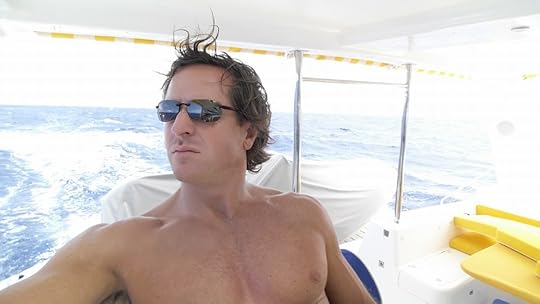
My thanks to Hugh for graciously taking time out of The Wayfinder
voyage to do this interview—I appreciate it!
Smooth sailing!
K.E. Lanning
Reprinted from the OMNI, [Now FUTURISM] Interview in March, 2017
In the Author's Universe: Interview with Sci-Fi Author Hugh Howey
July 28, 2017
The sci-fi writer's world: if we build it, will they come?
Science Fiction—what an odd couple those two words make.
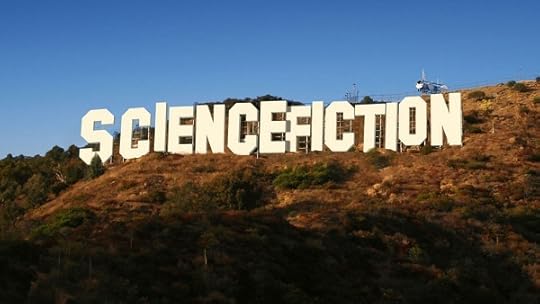
Science is defined as the systematic study of the structure and behavior of the physical and natural world through observation and experiment. [courtesy of Wikipedia]

Whereas, fiction is defined as literature in the form of prose, that describes imaginary events and people. [courtesy of Wikipedia]

Science and Fiction: Opposite and possibly opposing forces? Or two sides of the same coin—the fascination of discovery. (Now, when we flip those two words around: fiction (in) science; trust me, that doesn’t end well.)
Science fiction in all its forms allows us to ask the question: “What If?” It opens new worlds, new beings, and new sciences which allows our minds the freedom to conceive thoughts not allowed in our present existence. Story ideas in science fiction can stem from many sources—having an inquisitive mind along with a little research can stir the imagination.
As a genre, science fiction is confusing because within its bounds, there is a huge spectrum of sub-genres, and many novels are thrown into the sci-fi bag simply because of a twist of time rather than interstellar travel. A pet-peeve of mine: the terms soft and hard in reference to science fiction. A story which punches you in the gut with its social commentary should not be called “soft” and one which has a lot of technology, called “hard.” I personally don’t think that either Brave New World or The Handmaid’s Tale is “soft.” To me, whether a story is laced with detailed science, though interesting, is a superfluous classification. As a scientist, I enjoy the creation of gadgets, but as a reader, I prefer that the gadgets blend seamlessly and not override the story. Either a story is engaging, or not.
However, there is one constant of science fiction: World building. Creating this world can spring from the concept of a physical environment or a point of view, but in the end, must be believable, at least by those who want to come on the ride with you. (The ones who don’t want to believe, you don’t want them along for the ride anyway.)
If this new world is but a stage, we writers must fill that stage with characters we can touch, smell, love, or hate. Ernest Hemingway said it well, “When writing a novel a writer should create living people, not characters.” My tastes run to character driven science fiction with a splash of angst—it can’t be all fun, can it?
The great science fiction writers of past and present influence me: Aldous Huxley, George Orwell, Author C. Clark, Ursula K. Le Guin, Ray Bradbury, Margaret Atwood, and Robert Heinlein. These authors pushed boundaries with their words, leading readers into new territories of thought.
At the 2014 National Book Awards, Le Guin was presented with the 2014 Medal for Distinguished Contribution to American Letters, and during her acceptance speech, she spoke eloquently: “Hard times are coming when we will be wanting the voices of writers who can see alternatives to how we live now and can see through our fear-stricken society and its obsessive technologies to other ways of being, and even imagine some real grounds for hope. We will need writers who can remember freedom. Poets, visionaries, the realists of a larger reality.”
Ursula K. Le Guin accepts the National Book Foundation's Medal for Distinguished Contribution to American Letters at the 65th National Book Awards on November 19, 2014.
Huxley, Orwell, Atwood, and Heinlein created worlds of social speculation and that is the basket I throw my writing into, for humans will always remain humans—we fight, make love, have children—never shaking the primal “dirt” under our nails. Somehow, I suspect that aliens are the same; they come out of the celestial ooze like we did; unless, in your created world, they didn’t.
Science fiction gives the writer another dimension to twist, so he or she can illuminate a social flaw or magnify the pursuit of discovery. Readers of science fiction are passionate thinkers, ready to jump on board a rickety wagon in a dystopian future Earth or a space ship to the farthest solar system.
But we writers always wonder—if we build a world, will they come?
Published online at OMNI magazine on July 28, 2017: The Sci-Fi Writer's World
April 17, 2017
Margaret Atwood: Illuminating the Darkness
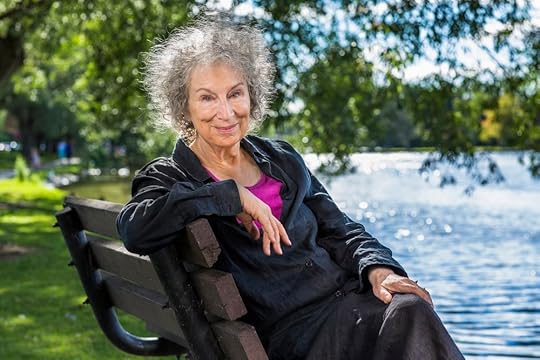
Margaret Atwood by photographer Liam Sharp
Margaret Atwood is a poet, a novelist, and an inventor. She was born in Ottawa, Canada in 1939 to Margaret (maiden name Killam), a nutritionist and to Carl Atwood, an entomologist. With her father’s research in entomology, her early childhood was spent deep in the forests of Canada. Always a voracious reader, she knew by the age of sixteen that writing would be her vocation. Atwood graduated in 1961 with a Bachelor’s degree in English from Victoria College in the University of Toronto, and in 1962, received a Master’s Degree from Radcliffe College, Cambridge, MA.
In 1961, she won the E.J. Pratt Medal for her book of poems, Double Persephone. Atwood has also been a writer of feminist works such as The Edible Woman, published in 1969.
In Atwood’s speculative fiction (literary science fiction) novel, The Handmaid’s Tale, published in 1985, she skillfully delivers a terrifying tale of a female protagonist caught in a wretched social and political nightmare within an authoritarian theocracy set in a future New England. In 1987, she won the first Arthur C. Clarke Award for this stunningly written novel.
Atwood’s latest novel, MADDADDAM, was published in 2013, completing the trilogy started by Oryx and Crake, in 2003, and followed by The Year of the Flood in 2009.
On par with Aldous Huxley’s Brave New World, and George Orwell’s 1984, Atwood's poetic prose is timeless, dissecting the accepted norms of society, politics, and the human condition. In a quote from The Handmaid’s Tale, Atwood’s protagonist Offred says, “We have learned to see the world in gasps,” a stark warning to never become complacent in our freedoms.
Margaret Atwood is an extraordinary person—a thinker and a story teller, using her literary talents to challenge our beliefs, carrying us on an allegorical ride through dystopian worlds facing environmental disasters and societal extremes—revealing the fragile nature of our humanity.
Hulu Premiere of The Handmaid's Tale
On April 26th, Hulu is premiering a new series, adapted from Atwood’s classic dystopian novel, The Handmaid’s Tale. Set in the near future, the totalitarian society of Gilead has come to power in the northeastern United States. Facing environmental disasters and a plunging birthrate, Gilead is ruled by a twisted fundamentalism in its militarized “return to traditional values.” As one of the few remaining fertile women, Offred (Elisabeth Moss) is a Handmaid in the Commander’s household, one of the caste of women forced into sexual servitude as a last desperate attempt to repopulate the world. In this terrifying society, Offred must navigate between Commanders, their cruel Wives, domestic Marthas, and her fellow Handmaids – where anyone could be a spy for Gilead – all with one goal: to survive and find the daughter that was taken from her.
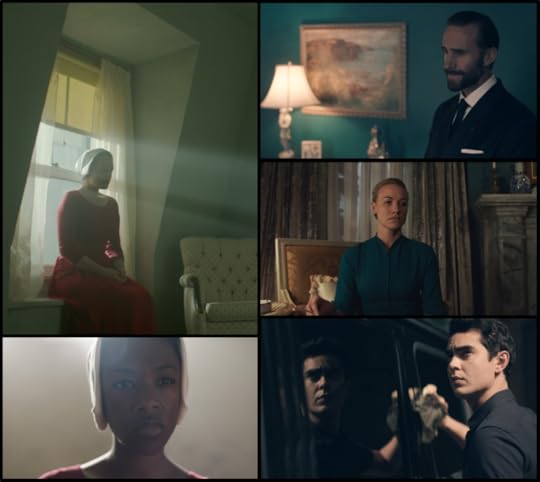
Photo credit: Hulu
This interview and the trailer for the Hulu series is available online at OMNI.
Interview with Margaret Atwood [text]
K.E. Lanning: It's really an honor to speak with you—I appreciate your time.
Margaret Atwood: Thank you.
I'd like to start at the beginning. In reading your bio, your father was an entomologist, so you spent a lot of your early years with your family in the forests of Canada. Why don't you tell us a little bit about your childhood and any significant events that shaped you as an author.
Well you never know these things. It was a reading family, because there was no electricity and we were not getting any TV. In fact, nobody in the late forties was getting TV much at all yet. Radio; we could get Russia on short wave, for what that was worth. Basically, it was reading, drawing, and writing.
I was an early reader, and there was never a book around that I was told I couldn't read. That would include everything from detective thrillers to biology textbooks, to sci-fi, because my dad, as a scientist, got a kick out of sci-fi. He had early classics around, such as Karel Čapek, Brave New World, and HG Wells.
I myself continued on in the fifties with Ray Bradbury as he published, and John Windham also as he published.
Recently, I did a list of dystopias for Omnivoracious, on Amazon and Goodreads.
As kids we were into rocket ships and other planets, and all of those things that I suppose really started with Flash Gordon and A Princess of Mars, War of the Worlds, those kinds of books in the early part of the century. That turned into Weird Tales and other magazines of the thirties.
We had the funny papers. On the weekend, there would be a supplement and a lot of well-loved comics. It was also the age of comic books in the late forties—the golden age of superheroes. Not just Batman, Superman, Wonder Woman, and Captain Marvel, but a whole bunch of other ones.
It was such a great golden age of [comics].
That's what people think now, but at the time they just thought it was bad for you, and that children shouldn't read them. That's when the comic’s code came in, but unfortunately for them, it only applied to colored comics, and you could still get the crime and horror in black and white.
They felt it wasn't as bad in black and white?
I don't know what they thought. It was actually worse. It didn't look as fake.
I was also reading that by the age of 16, you had already decided that writing would be your profession.
Vocation. There wasn't any chance of it being a profession, a profession for which you got paid. This as Canada in the fifties, you have to understand. You didn't expect to actually make any money out of it, so I had a brief flirtation with something called Writer's Magazine in which they listed in the back all of the places where you could sell things to magazines. The thing that paid the most was true romance, so I thought maybe I would write true romance in the day, and then in the evenings I would write my literary masterpieces, but that did not go very far because I wasn't actually up to the task. I could not do the vocabulary, which included at that time a lot of asterisks, and sentences like, and then they were one..... That I could not do. Things happened on sofas in those magazines.
These would be the stories in which there would be two male suitors, one would work at a shoe store and the other would have a motorcycle, and you just know what happens then. Wuthering Heights, only in modern setting.
You've gone over some of the writers that you enjoyed as a kid, but I was wondering, are there any other authors that you consider primary influences to your writing?
Apart from the fact that I read all of Edgar Allen Poe at too early an age—it was in the children's library section because it didn't have any sex in it. Who made that decision? I understand now, because I just did an introduction to a book of his. Ray Bradbury did the same thing—Poe was an early influence. I don't know whether you've read all of Poe, but some of it is terminally gruesome.
I know that in some of your discussions you've talked about having elements of environmentalism and humanism in your work. I was just curious [on your thoughts].
I would say environmentalism I grew up with—it's just part of biology. I'm not sure what humanism mean? I've never quite known.
The definition of humanism changes through history. In some definitions it's sort of an acceptance of you as a human and accepting everything about being a human, and not necessarily being obsessed with religion to the point of conflict with our humanness.
I'm a strict agnostic, by which I mean there's a difference between what you can know, which has to do with the physical word, and what you can't know. What you can't know remains an open question. Those things are a matter of faith, and there's just a difference between faith and knowledge.
Yes. I think that when you have religion that carries a club to beat the human out of you, then there's something wrong with it.
But that's just one use of religion. It's a narrative subset, by which I mean you can tell by looking at what kids do under the age of three or four what's in the human package. We know that language acquisition, and music and rhythm, and storytelling, and visual imagery—kids will do that very readily. They just pick it up.
A narrative, something that only human beings do, started pretty early to tell stories about where did we come from and what happens to us in the future, and Rover the dog will never do that. Rover the dog will never say, as far as we know, what was the origin of dogs, where did dogs come from, and will never say what will happen to me personally, Rover, when I die. But human beings do that all the time.
There are all of these different narratives, and there have been very many of them, and because there have been very many of them, it's no good saying to people you shouldn't do that, because it seems to be something that people do. If there shall be religion, which it appears that there shall be, let's hope that it is a good one, and not used as a hammer.
You probably say, well they're [ideologies]are a form of religion, or you could say that religions are a form of ideology, whichever you prefer, but when there is a belief system that gives you the permission to kill other people who don't share it, that's the negative aspect. But let us not be blind to the fact that there are positive aspects.
It's one of the things that sci-fi does all the time, makes up other religions.
Speaking of science fiction, I was interested in a discussion that I read that you were talking about the term science fiction as a genre, and the difficulty with that, and you feel like that what your work is speculative fiction.
Or we could just call it [sci-fi and speculative fiction] two different things. We can call it apples and oranges. Apples take place on other planets and have spaceships in them, and oranges take place on planet earth and have to do with what we're doing here now and only the technologies that we already have got our hands on. There's a difference in kind between those two things. I know that when I go to the sci-fi shelf, I expect there to be other planets. To avoid disappointment, because when I buy a package of bran flakes, I want there to actually be bran flakes in the box, to avoid disappointment, I feel they should be called something else.
I agree. I've had definitely difficulty with that myself. I think it's really more, from what I've been able to tell, agents and publishers that are more interested in keeping it within a genre to a certain extent.
As booksellers, they want to know what shelf to put it on. Which is annoying—Ursula Le Guin has quite a lot to say on the subject and I would agree with her that there are not bad genres, there are only bad books.
Margaret, one of the things I was really interested in is the fact that you're both a poet and a novelist. Really, your poetic prose is just stunning. I was wondering if you could just discuss a little bit your journey as a writer.
I don't know whether I have one. I'm so old that there were no creative writing schools.
I think Iowa had started, and in the early sixties one at the University of British Columbia had started, but that was it. We were not encouraged to think in terms of my journey as a writer. We were not at all encouraged in that direction. We were encouraged, if anything, if you were in academia, encouraged not to let on.
People a generation before mine had done things like gone to Paris. In the thirties people would go to Paris. People of my generation were pretty much led to understand, and this is Canada in the late fifties, that if you wanted to be an artist you needed to go to New York or London. If you were from Quebec, you needed to go to Paris.
Being perverse, I thought maybe I would go to Paris and live in a garret, drink absinthe, smoke, and get TB, and write masterpieces and work as a waitress, but that didn't happen. Although I did later work as a waitress.
It was not about my journey as a writer. It was about how do I support myself if I want to do this? That was what it was about. Then do you get a job that has something to do with writing, in which case you might use up all your writing energy doing that job, or do you get some other job that is not related? People have done both, like working in a bank and being a real estate agent or something.
In my generation, in the sixties in Canada, there weren't very many women writers, and writers were told things by other writers such as, in order to really understand the world, you have to be a truck driver. Except for me. As far as I know, they're not hiring girls yet. Anyway, I can't drive, so it was like that.
I think my journey as a writer consisted of not doing what other people told me I should do.
You really craft your characters very well, and I don't know if you could comment a little bit on how you're approaching your character development.
I think that people in sci-fi are people. Maybe you should try to make them as much like people as possible, unless they're of course an altered life form, in which case you make them like that. I don't think there's any big mystery to it. There was an age of sci-fi, I guess hard rocket ship sci-fi, that I wasn't terribly interested in. I was always more interested in people-centered stories, some of which were just pretty much fantasy under another name. They could all be classed as wonder tales, things that are not going to happen in real life. Under that huge umbrella you could put vampire stories, and werewolf stories, and Frankenstein, though we're getting a bit closer to that, Frankenstein and R.U.R (Rossum's Universal Robots) and all of them, you can call them wonder tales, but they do deal with age old motifs. I think that a lot of sci-fi got its main stories from mythology.
That's a good observation.
I'm not alone in thinking that. It's not an original thing with me.
One of your extraordinary books is The Handmaid's Tale, which was made into a film in 1990, and now Hulu has developed a series based on that novel, releasing on April 26th. I'm just curious how you feel about your work being adapted to the screen and how involved you've been in the process.
I worked in film and television in the seventies quite a bit, so I know the pitfalls and challenges, and in what ways a novel is not the same as a film or television. Right now we're in an age in which the well-produced series has really carved out a chunk, and it allows you to explore a longer work in depth, and follow characters in ways that you would not be able to do in a 90 minute film.
Whenever a new platform comes along, there's a huge burst of creativity as people explore it and build it out, and that is certainly happening right now.
I saw the trailer, and it looks really interesting.
Yes. I think in my opinion, it's pretty strong. If we're letting me be less Canadian about it, it's very strong.
I had an American writer friend who came up here and he said, they don't like my book. I said, they loved your book. He said, how can you tell? I said, the thing is that ‘not bad at all’ in Canadian is the equivalent of American, ‘best thing since sliced bread’, ‘stupendous’, ‘magnificent’, ‘never been equaled’. It means the same.
You have to have the Canadian to American translator?
Yeah. I think some of the poor Americans need it, whereas the Canadians, of course if they go down there, they think they've been elevated to the status of a god.
Speaking of that, you are a real icon of the literary world, and I was just curious, what do you feel is your legacy?
Are we talking about me being dead now? Is that the subject?
We're trying to get the words down before then.
You never actually know until you are dead, and you probably aren't going to know that either, but other people will know.
Legacies come and go, because everybody is always in the present moment, so it's a bit presumptuous to say that you will have a legacy that will be the same forever and ever, because it won't be. Typically what happens when somebody fairly well known dies is there is a bust of interest in their work, and then it either sinks into oblivion, never to be seen again, or it sinks into oblivion and then makes a comeback a little bit later.
Is there any message that you have tried to put forth [in your writing]?
How we were taught poetry in high school, we were taught what is the poet trying to say, which meant that we thought, why do they have to spend all those words if what the poet was trying to say was war is hell? Why couldn't they just blurt it out instead of putting us through a sonnet?
I don't go in for telling the reader what the message is, because everybody reads in an individual way, and takes away something that has something to do with what they brought to it, or let us say that the reader is the violinist of the book. Every reader is reading the same book, but each interpretation of that book is going to be different, so I strenuously avoid telling the reader what I prescribe the message to be, since my job as a writer is making a world that is as complete as I could make it.
I did write a book called originally Negotiating with the Dead, but the publishers were put off by the dead word and changed the title to A Writer on Writing. Squeamish, aren't they? In the beginning, in the introduction I said, first of all, I tried to figure out what all of these writer's motives were, dead writers and living ones, and it was everything from to justify the ways of God to man, or to get back at the people who were mean to me in high school, or it could be both. I think my favorite was a Czech writer who said, “I want to make a boudoir so that the reader can go into it and have fun.” I thought, that's no good.
There's a big leap between a boudoir for fun and to justify the ways of God to man. Instead I asked myself, and dead and living writers, what's it like to go into a book? I was looking at the beginnings of things, and everything from, I was wandering in a dark wood to Virginia Woolf saying writing a novel is like going into a dark room and holding up a lantern which illuminates things that were already there. All of the answers had something to do with going into the dark and illuminating something.
That's what writers do, in my opinion. You go into the dark, you go into an unknown, which is the thing you're trying to write, and then you attempt to illuminate it and bring something back into the light.
That's wonderful. I love the way you say that.
I believe I heard that you're writing a new novel. Is that correct? Is that what's next on the horizon for you?
I'm very cagey about saying what I'm doing. Once upon a time I did say what I was doing, and then, of course, I didn't do it, and I got an endless number of questions. But you said you were going to do that, why didn't you do it? There's no point saying what you're going to do until you've actually done it. For the same reason, I never actually tell my publishers what's going to be in my next book, because they would probably make horrified sounds. They usually want you to write the book you just wrote.
Margaret, I really appreciate you taking the time to speak with me, and best of luck!
This interview was edited and condensed for clarity.
My sincere thanks to Margaret Atwood for graciously agreeing to my interview, and to Lucia Cino, Melinda Casey, Lauren Thorpe, and Phoebe Larmore for all of your help.
February 4, 2017
The Ascent of Robots
In 1950, Isaac Asimov published the novel, I, Robot, and within that work, he outlined his “Three Laws of Robotics”:
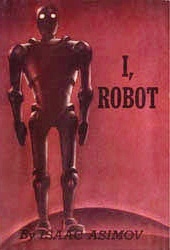
First edition cover (1950) of I, Robot
1. A robot may not injure a human being or, through inaction, allow a human being to come to harm.
2. A robot must obey orders given to it by human beings, except where such orders would conflict with the First Law.
3. A robot must protect its own existence as long as such protection does not conflict with the First or Second Law.
Humanity is on the cusp of a true robot revolution—will we be so prescient?
The technology shift in labor started with the computer age in the late twentieth century, but intelligent robots will be the coup d’etat for the labor market. Others are writing about this coming phenomenon: science fiction writer Liu Cixin is a nine-time winner of the Galaxy Award in China for his work and recently penned an article for The New York Times, titled, “The Robot Revolution Will Be the Quietest One.” [https://www.nytimes.com/2016/12/07/opinion/the-robot-revolution-will-be-the-quietest-one.html] He writes of a world run by robots more intelligent than we are…a world where humans become no more significant than pets.
Will society re-segregate not on lines of race, but divided between the rich upper class, the robots they control, and ‘the rest of us’? Or perhaps we’ll witness a societal backlash, with a new rise of Luddites rioting in the streets, destroying robots, while crowds chant as they upload the scene to social media?
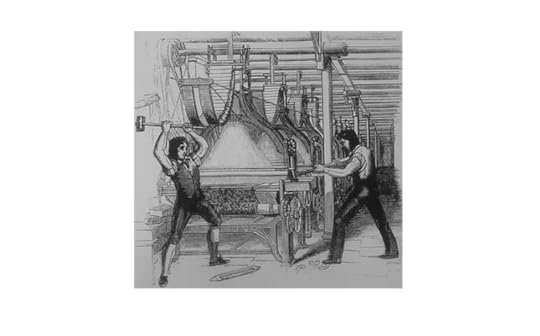
Luddites destroying looms in the 1800s to protest the Industrial Revolution
But the Luddites didn’t prevail at the dawn of the Industrial Revolution and neither will the coming Rage Against Robots.
Is it all gloom and doom? We humans have survived the industrial and computer revolutions, shifting with an ever-changing labor market, though there have been winners and losers in the game. There will be a huge demand for the care and maintenance of robots—feeding those brains with code and repairing the intricate mechanisms—harking back to a time when our ancestors cared for the faithful plow horse.
But one major impediment stands in our way—we humans are populating ourselves out of a planet even without the competition of robots. On our current trajectory in propagating the Earth, we will overload the boat and sink into the sea from where we came, unless we stabilize our population growth and find sustainable methods of living. The world populations must embrace education and birth control—our survival depends on it.
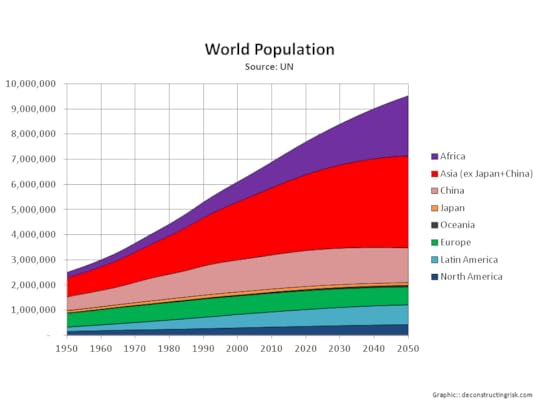
Darwin said, “It is not the strongest of the species that survives, nor the most intelligent, but the one most responsive to change.”
And change we must, because the Ascent of Robots is upon us.
K.E. Lanning, author of speculative science fiction and scientist
First published on January 26, 2017, in OMNI https://omni.media/the-ascent-of-robots
September 18, 2016
Rest in Peace, Edward
The world knows Edward Albee as an incredible playwright—his wry and acerbic wit revealing those dark human characteristics that no one wants to be revealed. He was a teacher, a mentor, and a supporter of the arts. This last avenue, in the vibrant art scene of Houston, is where Edward and I crossed paths. It was the 1990s; he was teaching at the University of Houston and producing his plays in various venues. I had an art gallery in Houston, TX, and I came to know Edward as a discerning and well-respected art collector.
I saw a show of some of his collection at the Hiram Butler gallery in Houston; it was a lovely exhibit and I was intrigued by the scope and depth of the artwork. His eye was phenomenal and he focused on up and coming artists with a message to tell. About that same time, I had begun curating a series of shows based on books that interested me in the content and title: The Garden of Eden (Ernest Hemingway), Brave New World (Aldous Huxley), and Extraordinary Popular Delusions and the Madness of Crowds (Mackay), as a few examples. I invited various artists from the unknown to the world famous to exhibit—they drew crowds—and Edward. After the opening of the Brave New World show, he wrote a letter to me asking a question on one of the pieces and we started a dialogue about the social implications of the show.
Edward began to frequent the gallery and I remember on several occasions, he would find some small sculpture in the back gallery (he loved three-dimensional work), cradling it in his arms as he toured around. He bought several pieces from the gallery and always stopped to chat when we ran into each other on the gallery circuit.
After I closed the gallery and began to find my voice in writing, he spoke with me about that, too. Our conversation wasn’t huge or life-changing, but sometimes having someone like Edward simply acknowledge your journey is enough.
Edward, you made a difference in my life. Thank you, and rest in peace, my friend.
K.E. Lanning



